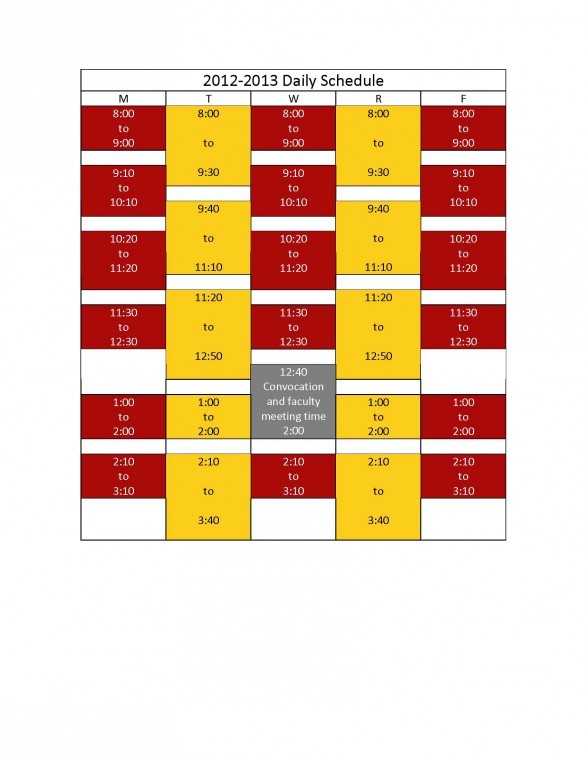New schedule receives mixed reviews
February 21, 2012
Change will be a common theme for Simpson in the 2012-2013 school year with a new sustainability minor, a new campus center and a new class schedule being implemented.
Monday, Wednesday and Friday classes will be lengthened by 10 minutes, while classes on Tuesday’s and Thursday’s will be extended by 15 minutes.
“The new schedule will provide more time for faculty and students to be together in class,” said Steve Griffith, senior vice president and academic dean. “When you have a 50-minute class, there’s not a whole lot of time to introduce new material. In addition, more and more faculty are using interactive learning techniques where students break off into groups that takes more time. It is important to the agency that does accreditation that we’re going from three credits to four credits and having more interaction with faculty is important.”
The new schedule, like the new curriculum, has been in the works for years.
“The faculty and several committees worked on the new schedule over the last several years,” Griffith said. “We did have students in the conversations. I don’t think that we put it out for a student vote.”
The faculty voted to approve the new schedule during the 2010-2011 academic year, but its launch was delayed.
“By the time we got faculty approval, I thought it was too late to rush it to start this year,” Griffith said. “Ideally it would have, but practically speaking we just wanted more time to make sure that it would work.”
Now, it’s up to the departments to make the schedule work for their subjects.
One scheduling hiccup comes from the music department. In order to avoid late ensemble practices, the department decided to move one choir practice to a regularly scheduled class period.
“We’ve essentially taken one of those rehearsals out on Monday, Wednesday and Thursday and put it earlier in the day in the schedule,” said Tim McMillin, associate professor of music and director of choral activities. “For us, the effect is that every thing is going to end a half hour earlier than it would have or it currently does by doing one less rehearsal in the evenings.”
This switch is both advantageous and a possible detriment to choral ensemble students because students won’t be rehearsing at 5:30 p.m. However, a choir will be scheduled opposite another class.
“We are being as careful as we can in scheduling, so we’re hoping not to run up against single sections of a particular class,” McMillin said. “Our goal always has been that certainly students within music can be involved in band and choirs and certainly students on campus don’t have to decide ‘Oh, I have to take this other class instead of an ensemble.’ It’s becoming a little more difficult to do that, but we’ll hope that this still works out.”
Another course working on class time compromise is the Simpson Colloquium.
“The special time set aside for Simpson Colloquium is gone,” said Nick Proctor, professor of history and director of the Simpson Colloquium. “I talked about how I thought that face time is an important part of Simpson Colloquium and that I’m going to be meeting my Simpson Colloquium four times per week. The days and the times will be different than they are now.”
There is one course time that occurs four days a week in the new schedule. It is a 1-2 p.m. section that meets Monday, Tuesday, Thursday and Friday.
“I’ve also told instructors if for what ever reason they don’t want to do that time slot or they figure out a better way for them to have the contact time with students that’s fine with me,” Proctor said. “I didn’t require anyone to do any particular time slot.”
One reason Proctor didn’t push for colloquiums to meet during the 1 p.m. class is because of potential competition from various departments for that course time.
“Other people want to meet four times a week, too, particularly lower level foreign language and math classes,” Proctor said. “If all Simpson Colloquiums met then, you wouldn’t be able to have first year students in a 100-level language class or in a 100-level math class that met then. It’s not conducive because a lot of people want to use that time slot for introductory level classes, so it wouldn’t be fair for Simpson Colloquium to hog it all.”
While Simpson Colloquium has lost its set class time, the science department is lacking a class period and classrooms.
“We lost a whole time slot each Monday, Wednesday and Friday for scheduling courses in the sciences,” said Jackie Brittingham, professor of biology and biology department chair. “This means that we had a harder time avoiding possible conflicts for science courses during the day. We also had a more difficult time finding rooms in Carver Science Building to accommodate classes on Monday, Wednesday and Friday.”
There could be double scheduling trouble created by the 1 p.m. class for the science department.
“If you take into account the 1p.m. slot that meets four days a week, where faculty are discouraged from using for classes that only meet three days a week that means that we are down two class periods per day, not just one, compared to our ‘old’ schedule,” Brittingham said. “Again this is a challenge for the sciences more than other areas because three hour labs are scheduled at 2:10-5:10 p.m. every day of the week, except for Fridays, so we can’t teach a lecture class at 2:10 p.m. if we want our science students to enroll in it.”
According to Griffith many institutions are making the scheduling shift to more time and less classes. In addition to faculty concerns, he has heard student criticism.
“The things I’ve heard some students say is that we don’t need more time in a time block and that it’s too long of a time block,” Griffith said.
Despite comments by students and professors, the faculty-approved schedule will be enacted for the 2012-2013 academic year.






